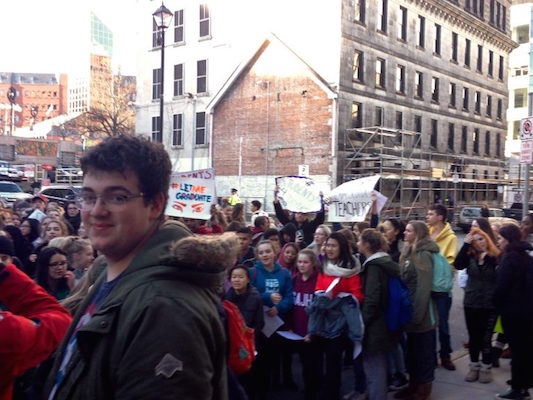
Premier Stephen McNeil had plenty of potential (Hobson’s) choices he could have chosen while he filled his weekend with “considerable soul searching.”
How should the premier have responded after Nova Scotia’s 9,300 teachers said no thanks, no thanks, and no thanks again to his government’s contract offers? This was not only the third time the teachers had rejected a government contact offer in 14 months, it was also with the largest percentage of teachers voting no: 61 per cent the first time, then 70 per cent and now 78.5.

The premier, of course, could have acknowledged his government’s approach to bargaining (or not bargaining) with the teachers had been wrong-headed from the outset, replaced Education Minister Karen Casey — the pointy-end of the government’s teacher-beating stick — and given a new education minister a more positive mandate to find a way out of this mess that would at least sort-of satisfy teachers, taxpayers, and students without breaking the government bank.
He didn’t. He wouldn’t. He couldn’t. It’s not in his DNA.
McNeil was even less likely to fire himself, although he is clearly the real architect of the failed strategy to bring public sector workers to heel by first picking off their weakest link, public school teachers.
Some weakest link.
Some strategy.
The teachers had said they wanted the government to return to the bargaining table, but unless the government had actually been prepared to bargain with them — which it wasn’t — that seemed a pointless continuation of an already pointless exercise for all concerned.
The more logical approach — not that this government is big on logic — would have been to wait and see what the teachers did next. The union does have a strike mandate, though it was unlikely to use it, except as a very last resort.
Assuming the union had carried on with its work to rule campaign, it could have found itself slapped down in the Supreme Court of Nova Scotia within a few weeks anyway over one aspect of work to rule. Five Nova Scotia universities are challenging the union’s directive to teachers not to supervise student teachers, who require real classroom time in order to graduate.
Even if the union had lost in court, McNeil knew the “student teacher” issue wasn’t likely to resonate with parents or students nearly as much as the possibility of cancelled senior proms and unwritten university reference letters.
But the longer work to rule dragged on, the greater the risk teachers would lose the critical support of parents and students. At which point, the Liberal government could have called an election and asked voters to decide. In spite of the fact polls show the Liberals continue to be the choice of voters, however, everyone, including the Liberals, knows the electorate is volatile. (That’s probably why the Liberals themselves chose not to go to the polls last year.)
So the government has decided instead to call the legislature back into emergency session tonight to impose a new contract on the teachers. We know the hilarity and embarrassment that ensued in December when the government initially tried to do exactly that. Parents and students took to the streets, Liberal backbenchers threatened a revolt and the government closed, then un-closed schools while calling, and then un-calling a special session of the legislature.
No one in government wants a repeat of that, so one assumes — though one should assume nothing — the government will be better prepared this time.

McNeil, in fact, has three similar — and similarly rejected — contracts to choose from. That union members rejected those three tentative agreements, each (reluctantly) recommended by their own bargaining committees, will give the government legal cover in an expected court battle over his decision to legislate an end to the impasse.
That said, unilaterally imposing a contract on teachers will only have the effect of more starkly caricaturing the government as the schoolyard bully forcing its will on the teachers.
And, of course, imposing contract will do nothing to resolve the important issues facing public school education in Nova Scotia — “better learning conditions, safer schools and more time to spend helping students instead of doing paperwork.”
But, of course, that was never the government’s point in these non-negotiations. The point was to show who’s in charge. Stephen McNeil has definitely accomplished that.

Great perspective here which I think clearly shows the political thinking behind this. The Premier is gambling that more voters hate the Public Service than feel sympathy. Austerity is his mantra but he still sends money to Portland in the US and the foolish ferry deal. He needs to roll back those unsupported corporate hand outs, invoke penalties on the Nova Centre boondoggle and close NSBI if he truly wants to practice what he is preaching.
Meantime, he is using our greatest future asset, our youth, as helpless pawns in his game of cheap politics.
The public sector unions and the NSTU have known this was always in the Premier’s back pocket and have had plenty of time to build a legal case. When this goes to court, it may decide whether employers can force their staff to accept rates and conditions that suit them rather than actually negotiate in good faith when they happen to be governments, or whether the right to collective bargaining implied by the Charter right to free association prevails. A major precedent affecting jurisdictions and public sector workers all over Canada could ultimately be determined here. McNeil could end up foot binding governments into genuine workplace negotiation / binding arbitration or finally destroy the ability of unions to protect the interests of Canadian workers indefinitely.
When the BC government unilaterally stripped teachers of certain rights in 2003, the Supreme Court of Canada ruled against it, costing BC over $300m – a victory for BC teachers. The downside was that this legal process dragged on for 14 years.
My non-legal guess is that what McNeil is about to do to our teachers (followed in short order by the rest of our civil service) may well be unconstitutional, but that he is playing the longer game. He is gambling that the courts will not rule against him before the next election, due later this year, nor likely the one after that.
So he will go to a divided public encouraged to believe that anyone who earns more than they do is being paid too much, chanting his mantra that the cupboard is bare (in spite of the evidence) and that he alone was the White Knight who saved us all from vile penury that would have been inflicted upon us by all those greedy teachers and other civil servants. A politically detached, mean spirited electorate feeling hard pressed by high taxes and power bills will enjoy the satisfaction of poking teachers and less visible civil servants in the eye, rewarding a simple minded government determined to cut their way to prosperity when the actual cause is collapsed revenues, not excessive spending.
After years of costly resistance by future NS governments, when Bills 148 and 75 are finally struck down by the Supreme Court of Canada and Stephen McNeil is sucking on the teat of a fat pension paid for by a grateful public, why should he give a damn? Consequences of that judgement will fall on the watch of other hapless governments all over Canada, not his. It was a good electoral tactic.
Worked well in the day.